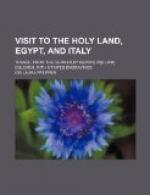The ladies of the harem seemed to look with contempt upon employment and work of every kind; for neither here nor elsewhere did I see them do any thing but sit cross-legged on carpets and cushions, drinking coffee, smoking nargile, and gossiping with one another. They pressed me to sit down on a cushion, and then immediately surrounded me, endeavouring, by signs, to ask many questions. First they took my straw hat and put it upon their heads; then they felt the stuff of my travelling robe; but they seemed most of all astonished at my short hair, {165} the sight of which seemed to impress these poor ignorant women with the idea that nature had denied long hair to the Europeans. They asked me by signs how this came to pass, and every lady came up and felt my hair. They seemed also very much surprised that I was so thin, and offered me their nargile, besides sherbet and cakes. On the whole, our conversation was not very animated, for we had no dragoman to act as interpreter, so that we were obliged to guess at what was meant, and at length I sat silently among these Orientals, and was heartily glad when, at the expiration of an hour, my friends sent to fetch me away. At a later period of my journey I frequently visited harems, and sometimes considerable ones; but I found them all alike. The only difference lay in the fact that some harems contained more beautiful women and slaves, and that in others the inmates were more richly clad; but every where I found the same idle curiosity, ignorance, and apathy. Perhaps they may be more happy than European women; I should suppose they were, to judge from their comfortable figures and their contented features. Corpulence is said frequently to proceed from a good-natured and quiet disposition; and their features are so entirely without any fixed character and expression, that I do not think these women capable of deep passions or feeling either for good or evil. Exceptions are of course to be found even among the Turkish women; I only report what I observed on the average.
This day we rode altogether for seven hours. We passed a beautiful orange-grove; for the greater part of the way our road led through deep sand, close by the sea-shore; but once we had to pass a dreadfully dangerous place called the “White Mount,” one extremity of which rises out of the sea. This once passed, we soon come upon the beautiful far-stretching aqueduct which I noticed on my journey from Joppa to Jerusalem. It traverses a portion of this fruitful plain.
We could not enter the little town of Sur, the goal of this day’s journey, as it was closed on account of the plague. We therefore passed by, and pitched our tents beside a village, in the neighbourhood of which large and splendid cisterns of water, hewn in the rock, are to be seen. The superfluous water from these cisterns falls from a height of twenty or thirty feet, and after turning a mill-wheel, flows through the vale in the form of a brook.




